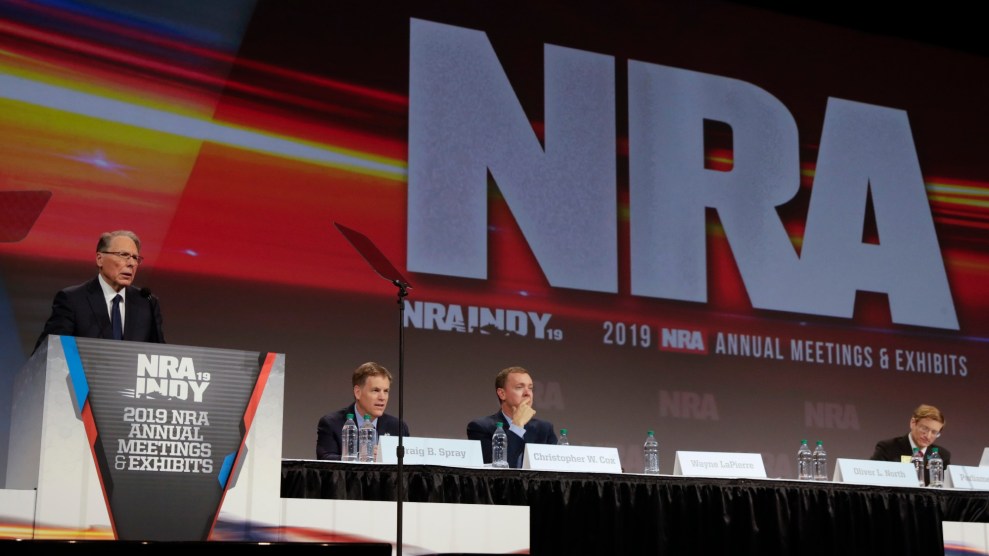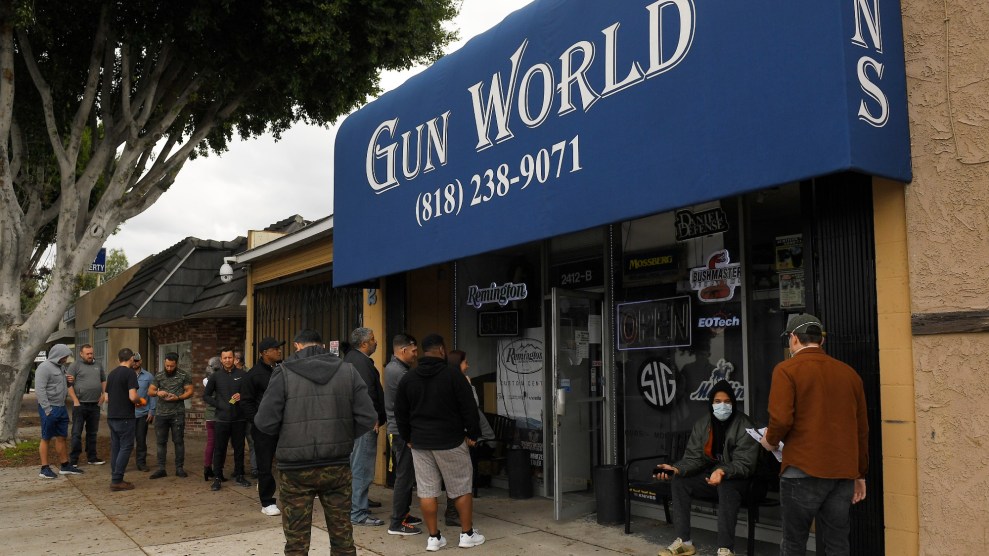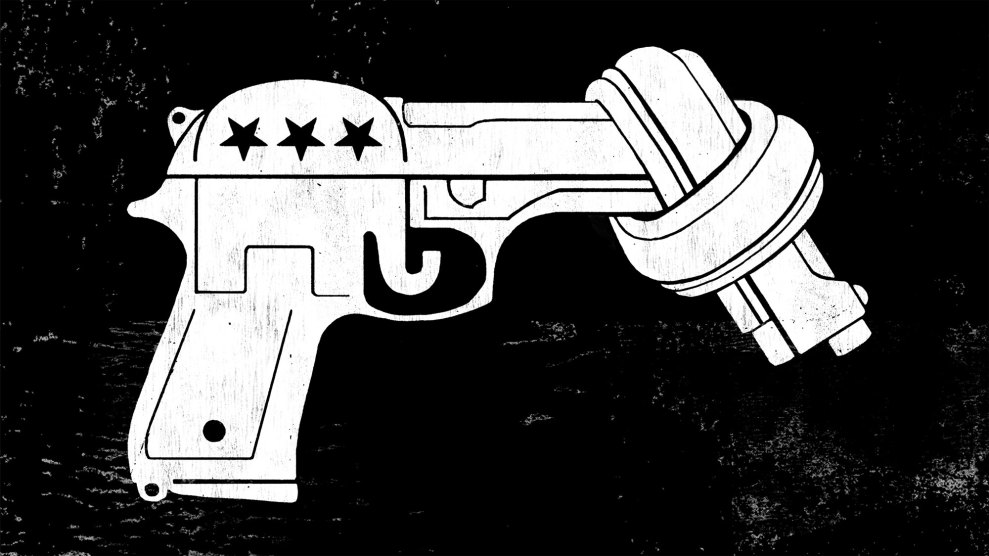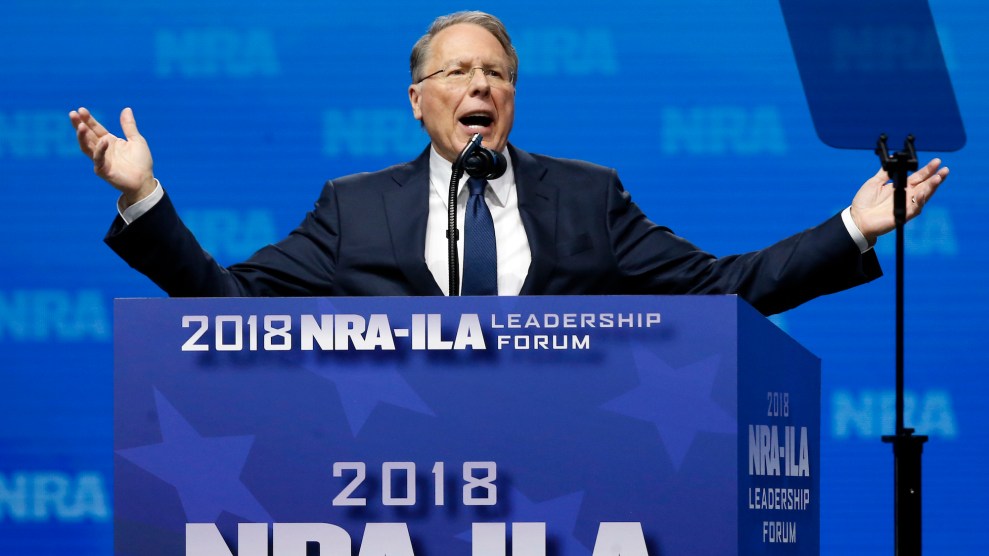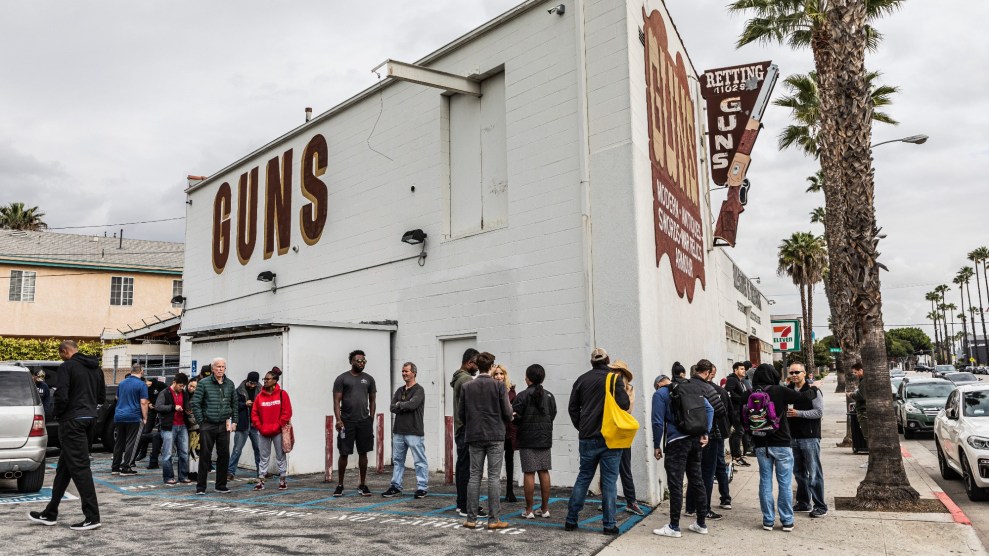
A long line outside of a gun store in Culver City, California, in mid-March, at the outset of the COVID-19 crisis. Ted Soqui/Sipa via AP
Just weeks into the nation’s coronavirus lockdown, the FBI reported a startling statistic: The month of March smashed the bureau’s all-time record for processing background checks for gun purchases. Since there is no national database of weapon sales, the FBI’s National Instant Criminal Background Check System, or NICS, is considered to be the best available indicator of how many firearms are being sold. According to the FBI, NICS recorded 3.7 million background checks in March, which was 12 percent higher than its previous record, set in December 2015. In other words, since the pandemic began crippling the country, people have been buying guns at a staggering rate.
It’s tough to determine who, exactly, is buying guns and for what reasons. Anecdotal reporting suggests that many of the sales are panic purchases by first-time gun owners. Of course, it’s helped that President Donald Trump—after a lobbying blitz from gun rights groups—issued guidance that gun shops should be considered essential businesses and allowed to remain open, even as states were forcing other retailers to close their doors in an effort to slow the spread of the virus. Many state governors complied, and some even reversed previous orders to have gun stores closed, citing Trump’s guidance. The National Rifle Association filed lawsuits against local jurisdictions that forced gun stores to shut down, including the states of New York and New Mexico and two counties in California.
For gun control advocacy organizations like Everytown for Gun Safety and the Coalition to Stop Gun Violence, the spike in firearms sales is beyond alarming—and they worry that it could lead a surge in gun violence. Despite the coronavirus lockdowns, some cities, such as Cincinnati, Philadelphia, and Chicago, have actually seen increases in shootings since the crisis began. Meanwhile, a number of police departments and hotlines have reported spikes in domestic violence calls, as women have no choice but to quarantine with their abusers—many of whom own firearms. Gun control advocates also worry that more people with firearms, combined with economic chaos and increased social isolation, could result in a rise in gun suicides and accidental shootings. “All the anecdotal evidence that we are seeing—massive increase in domestic violence hotline and shelter groups calls, the unemployment numbers, the isolation, the increased alcohol use—all point to a rise in gun deaths,” says Andrew Patrick, the director of political communications for the CSGV.
At the center of the controversy is the NRA. Ever since the emergence of COVID-19 sent the world into a tailspin, the group has sought not just to fight to keep gun stores open and boost firearms sales, but also to stoke fear and suspicion during the country’s darkest hour. On social media, in videos, and in blog posts, the nation’s oldest and most influential gun rights organization has repeatedly pushed out alarmist messaging suggesting that the pandemic will lead to a societal breakdown—and that the only way people can protect themselves and their families is by purchasing a gun.
One NRA video from March features Carletta Whiting, a disabled woman holding an AR-15-style weapon, explaining the importance of having a gun. “I know from history how quickly society breaks down during a crisis,” she says in the video, which is interspersed with footage of looting, “and we’ve never faced anything like this before, and never is a Second Amendment more important than during public unrest.”
Americans are flocking to gun stores because they know the only reliable self-defense during a crisis is the #2A.
Carletta Whiting, who’s disabled & vulnerable to #coronavirus, asks Dems trying to exploit the pandemic: Why do you want to leave people like me defenseless? pic.twitter.com/wDeEYHqzOU
— NRA (@NRA) March 21, 2020
In another video, shared last month, country music legend Charlie Daniels unloads on pro-gun-control lawmakers: “Left up to some politicians, all you’d have to defend your home with would be a stick, some rocks, and if you’re lucky a slingshot, because they want your guns. They want them all.”
None of this is surprising to John Feinblatt, the president of Everytown. He’s seen this playbook from the NRA before—in the aftermath of Hurricane Katrina and at times during the presidency of Barack Obama, who, the NRA repeatedly suggested, might confiscate Americans’ guns. But what’s happening now, Feinblatt worries, could have far more serious consequences. Since the outset of the pandemic, the NRA has argued that the 2nd Amendment “is a constant in times of crisis,” blasted the FBI’s background check system for delaying people’s access to firearms, and suggested that one reason Americans are buying guns is because “law enforcement [is stretched thin due to sick or quarantined officers, and hundreds of inmates being released from jails and prisons.” The group has pointed to “fears that certain goods may not be restocked at local stores, that the supply chain can’t keep up with demand,” and has argued that Democratic politicians are exploiting the pandemic to push gun control efforts.
“They’ve got two lines that they are going on: that the only way to stay safe during a pandemic is to buy a gun—despite the fact that you can’t shoot at a virus—and that…criminals are on the loose, food shortages will lead the looting, and COVID-19 responses are a sign of the apocalypse,” Feinblatt says. “It’s a tragedy, because in a time when there’s already a risk of heightened domestic violence and suicide, this type of fearmongering is making matters all the worse.”
It’s impossible to link recent examples of gun-related violence to the kind of messaging that Feinblatt describes. But publicly reported details about several such incidents underscore his concerns. At a bank in Alpharetta, Georgia, according to police, a man allegedly pointed a gun at two people wearing masks and gloves and yelled at them to back up because he feared contracting COVID-19 from them. A man who allegedly fatally shot his 13-year-old cousin by accident told police that “he was arming himself for protection amidst the COVID-19 scare,” in the words of the Albuquerque Journal. And on an island off the coast of Maine, a group of local vigilantes with guns allegedly tried to force out-of-towners renting a house into quarantine. More recently, a security guard at a Family Dollar in Flint, Michigan, was shot and killed after he told a customer that she had to wear a mask, as required by a state executive order, according to law enforcement officials.
Feinblatt worries these incidents will put further stress on health systems that are already buckling under the pressure of COVID-19. “Corona-related incidents of gun violence and more gun violence is only going to do one thing,” he says, “which is, strap our…precious resources that are completely strained in hospitals.”
The NRA’s coronavirus messaging comes at a time when the group is basically on life support. Like a great number of other non-profits, it’s been hit hard by the crisis’ economic fallout. Earlier this month, Politico reported that the NRA had laid off more than 60 employees since the pandemic began. Even before the virus hit, the group was in a deep financial hole. Since its mammoth financial effort to help elect Trump, it has struggled, spending more money than it was raising as internal scandals and expensive legal battles drained its finances. Feinblatt suspects the NRA is seizing on COVID-19 as an opportunity to right the ship. “They’re exploiting people’s fears during this pandemic, and they’re doing it in order to sell more guns and raise money,” he says.
Asked to respond to Feinblatt’s criticism, the NRA took aim at Michael Bloomberg, the billionaire Everytown founder and erstwhile Democratic presidential candidate. “Everytown must be reeling after Mike Bloomberg’s pathetic showing in the presidential primary proved billions of dollars can’t buy elections, so they’re resorting to blatantly false narratives,” a spokesperson for the gun rights group said. “Let’s correct the record: The NRA does not make money off gun sales. We are a member organization operated on donations and dues from good people across America. We worked tirelessly during this pandemic to keep gun stores open so that law-abiding families can keep safe. Yes, that has resulted in more gun owners and more self-defense voters across the country. And, yes, most of them will likely remember that Biden, Beto and Bloomberg want to confiscate their guns and abolish their right to self-defense.”
Meanwhile, as the coronavirus death toll continues to rise, thousands of people, often decked out in MAGA gear, have participated in protests against stay-at-home orders. Many of the demonstrations—which first started in Michigan, but have since spread across the country—have been the work of right-wing protesters who, like Trump, have looked to blame Democratic governors for the economic fallout caused by the pandemic. Early polling suggests that the protests are unpopular with the general public, but they’ve proved to be a breeding ground for fringe conspiracy theories and misinformation. Trump, for his part, has poured gasoline on the fire, tweeting out support for the demonstrators and encouraging them to “LIBERATE” their states. Last week, as Michigan lawmakers met in Lansing to debate an extension of Gov. Gretchen Whitmer’s (D) emergency orders, dozens of screaming, armed demonstrators entered the state Capitol building, demanding to be let into the legislative chambers. In response, Trump praised the protesters on Twitter, calling them “very good people” and saying that Whitmer “should give a little and put out the fire.”
The NRA—in both public messaging and in statements by members of its 76-person board of directors—has encouraged the demonstrations. Earlier this week, the group endorsed Republican Dan Rodimer, a former professional wrestler now running for Congress in Nevada who led a march to the governor’s mansion, in protest of Gov. Steve Sisolak’s (D) stay-at-home order. In a video of the march, several protesters can be seen carrying firearms.
In an op-ed for the Daily Caller, NRA board member and former Georgia Rep. Bob Barr said the coronavirus national emergency endangers “the Constitution and the Bill of Rights,” writing that it “appears the federal government is readying additional measures that would undercut one of our Founders’ deepest fears—use of the military for domestic law enforcement purposes.” In a different op-ed, for the conservative news site Townhall, Barr echoed NRA messaging about the importance of having a gun during the pandemic, writing, “It is precisely in times of emergency, when the risk of looting and other criminal behavior increases, that the rights guaranteed by the Second Amendment become most important.”
On Twitter and Facebook, other NRA board members have been more direct in pushing to reopen the country. Rock star and board member Ted Nugent said that protesters at an earlier anti-lockdown rally in Michigan were “my people.” Another board member, Allen West, a former member of Congress from Florida, tweeted, “Doggone, open up our economy, get the American people back to work! Treat us as adults and not infantile drones who can be herded to and fro as political pawns.” After the latest Michigan protest, West tweeted that “the most dangerous virus in America right now is not COVID-19…[it] is tyranny.” Willes Lee, another NRA board member, tweeted that “lying media and corrupt Dems want America closed. First they bitch that Trump isn’t a king to order states to open…then they whine that he needs to order Kemp to keep GA closed.”
Last week, Anthony Colandro, an NRA board member who has a history of hate speech, attended an anti-quarantine protest in New Jersey. In a video posted on his Facebook page, which have since been removed, Colandro called the pandemic “a bunch of bullshit.” Prior to the rally, Colandro posted now-deleted videos encouraging people to attend. In a video shot at the rally, Colandro said that COVID-19 “is a media virus” and added, “We are being spoon-fed socialism every day and 8.5 million people are just bending over and taking it… Y’know what? I hope you all get an anal probe with a microchip in it because this is what we’ve become: sheep.”
The NRA spokesperson wouldn’t comment on the statements made by Colandro or any other board members, telling Mother Jones that “board members don’t speak on behalf of the organization.”
If you or someone you care about may be at risk of suicide, call the National Suicide Prevention Lifeline, a free 24/7 service that offers support, information, and local resources: 1-800-273-TALK (8255).

